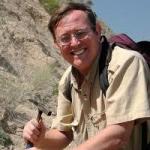As our family story goes, when my parents left eastern Oklahoma for California (the first in their  Don Protherofamilies to move that far away in generations), many of their relatives bid them farewell with a sense of foreboding, quite certain that they would someday soon perish in a terrible earthquake. This may seem odd coming from people who dealt regularly with tornadoes, but it’s an opinion that persists to this day in many parts of the country, and demonstrates a sentiment which is returned with alacrity by people who can’t imagine living with the seemingly constant threat of deadly twisters known all too well by Oklahomans.
Don Protherofamilies to move that far away in generations), many of their relatives bid them farewell with a sense of foreboding, quite certain that they would someday soon perish in a terrible earthquake. This may seem odd coming from people who dealt regularly with tornadoes, but it’s an opinion that persists to this day in many parts of the country, and demonstrates a sentiment which is returned with alacrity by people who can’t imagine living with the seemingly constant threat of deadly twisters known all too well by Oklahomans.
Last night’s talk by Dr. Don Prothero, professor of Physical and Historical Geology, Sedimentary Geology, and Paleontology at Occidental College, brought this family lore back to me. His talk, entitled “Catastrophes” and given at Café Valparaiso in Berkeley, assured me that my relatives were not alone in their tendency to oversimplify their threat evaluation of natural disasters. Prothero provided many detailed examples of death and destruction caused by a wide variety of nature’s hazards, and pointed out some facts that challenged my own thoughts about them. For instance, many of us are aware that The Great 1906 San Francisco Earthquake resulted in approximately 3,000 deaths with its subsequent fires leveling much of the city, but fewer know that the largest quake in North America was actually the 1812 New Madrid Earthquake, whose epicenter was in an area that is now part of Missouri. It was felt over an area of approximately 6,000 square miles, ringing bells and toppling steeples from Canada to Mexico, and as far east as Boston.
Earthquakes are not the only natural disasters, of course, and they’re not even the most deadly. As Prothero pointed out, the worst natural disaster in American history was actually the 1900 Galveston Hurricane in Texas which killed over 12,000 people (by contrast, the more recent Hurricane Katrina claimed 1,800 lives). Even more threatening to human life was a volcanic event known as the Toba Supereruption which took place in what is now Indonesia over 70,000 years ago. It claimed all but a few thousand breeding pairs of humans, creating a bottleneck in human evolution that almost spelled the end of humanity; the dramatic effect of that event can even be found in the genetic code of human parasites! Now that, my friends, is what you call “a close one.”
Volcanoes have done their fair share of damage in more recent times, as well. Prothero told, for instance, of the 1815 eruption of Mount Tambora on the island of Sumbawa, Indonesia, which sent so much ash into the planet’s atmosphere that it lowered global temperatures between 0.4 and 0.7 °C (0.7–1.3 °F), resulting in major food shortages, as well as what has become known as The Year Without a Summer. (On a more positive note, the resulting bad weather confined British novelist Mary Shelley indoors at Lord Byron’s summer residence on Lake Geneva so long that, out of sheer boredom, she would sit down and write a short story that would eventually become Frankenstein.)
Today, much of the world has worked to become far more prepared than earlier civilizations to handle the aftermath of large scale natural disasters, but Prothero cautions us to keep things in perspective. In the grand scheme, famine, infectious diseases, and even such mundane events as lightening strikes are a much bigger threat to us than natural disasters. In fact, you have a greater chance of dying from a snake bite this year than dying in an earthquake. And surprisingly, nearly 40% of the deaths from natural disasters will be due to severe weather (e.g., snowstorms) and extreme heat/drought, two natural event categories most people never even consider.
In the end, the message Dr. Prothero left us with last night was this: Stay educated about how to respond to natural disasters, and support efforts to keep ourselves as safe as possible in such events, but be aware that most of us will die from heart disease, cancer, stroke, infections, and car accidents. So rather than spending another sleepless night worrying that Mother Nature may throw you a curve ball, a better use of your efforts might be to cut down on the hamburgers, monitor your physical health, and wear your seat belt.
——————
Sheldon W. Helms, associate professor of psychology at Ohlone College in Fremont, CA, is a dues-paying member of the Bay Area Skeptics, and serves on its Board of Directors.
